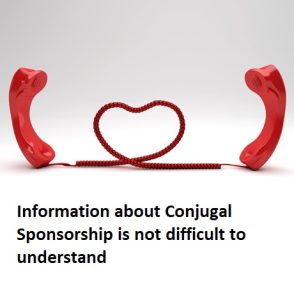Sponsoring Your Conjugal Partner
Do you and your significant other dream of settling down in Canada in the future? Are you worried this is not possible because you are not legally married, and do not meet the requirements of a common law relationship, either? There is good news! You may be able to sponsor your partner, by applying for the conjugal sponsorship. In this blog, you will learn what a conjugal partnership is, and how conjugal partners can apply for sponsorship under the Family Class, despite not being eligible as a legally married couple or being legally recognized as a common law partnership.
What is a Conjugal Sponsorship
A conjugal sponsorship is a sponsorship application used to bring one’s partner into Canada. Conjugal partners are couples in a marry-like relationship, but who are unable to live together in Canada due to various reasons. This type of sponsorship is for situations where the Canadian and their foreign partner are unable to qualify for family sponsorship as spouses or common-law partners. If you and your foreign partner do not meet the descriptions of a common law partnership due to situations that are beyond your control, the relationship you and your foreign partner have may be deemed as a conjugal partnership.
Am I eligible for Conjugal Sponsorship
To determine your eligibility, you need to make sure you have a compelling reason with regards to your inability to live with or to get married with your partner. The following are some examples:
- you have had a conjugal relationship with your sponsor for at least one year
- you cannot live together or marry because of an immigration difficulty (you were refused long-term stays in each other’s country)
- you cannot get married because you are married to someone else and living in a country where divorce is not possible (for example, the Philippines)
- you are living in a country where a same-sex relationship and same-sex marriage is not permitted
The most essential part of a conjugal sponsorship is that you have to prove you and your partner are not able to live together or to get married. That being said, if you could have lived together but chose not to, then you are not eligible to apply for conjugal sponsorship. On the other hand, if you are engaged to be married (in this case, you should either apply for a spousal sponsorship once the marriage has taken place or apply for a common-law sponsorship if you have lived together continuously for at least 12 months), then you cannot apply for conjugal relationship, either.
How does IRCC Examine Your Conjugal Relationship
Firstly, you must prove to an immigration officer why you cannot apply for either a spousal sponsorship or a common-law partnership. You must present compelling reasons to show why you and your partner cannot live together or get married reasons. The reasons can be war, strict foreign/religious beliefs, disasters, or other unavoidable reasons causing the two to be unable to reside together. If there is no valid reason for why you two are not living together, then the application will most likely be refused.
The IRCC officer will also examine documents that demonstrate the fact that your conjugal relationship is genuine. Some examples of supportive documents may include birthday cards, text messages on social media platforms, photos together, reference letters from family and friends, joint bank account, etc. There also needs to be an explanation as to where your relationship is going to go, how you first came to know each other, the length of the relationship, how you have been communicating to each other since, and what you are planning to do after receiving your conjugal sponsorship approval.
From the information given on your application and the supporting documents, the IRCC officer will determine if you qualify for a sponsorship as a conjugal partner. The officer will look specifically into the mutual commitment to share in you and your partner’s life. Exclusivity significantly matters as well. Exclusivity means that both partners cannot be in another conjugal relationship, and they are committed to being sexually exclusive with each other. Furthermore, the officer will determine whether the couple depends on each other for physical, emotional, financial, and social support. Last but not least, the officer will assess your relationship based on the openness. The openness refers to the extent your family members, friends, colleagues, and neighbors know about your relationship.
Finally, you must be able to provide the immigration officer with a medical examination and a police background check of the person you are inviting to Canada. This is to show that the principal applicant does not possess any security/safety risk to Canadian citizens and permanent residents.
Contact Akrami and Associates
The requirements of the sponsor and principle applicant, undertaking period, meaning of a conjugal sponsorship, reasons for sponsor preventions, and who conjugal sponsorships are applicable to are all essential information one must know and take into consideration when applying for a conjugal sponsorship. Having to understand all the information and having to prepare the application can be exhausting and overwhelming. Akrami and Associates have dealt with many conjugal sponsorship applications and have in-depth knowledge of the conjugal sponsorship. Please feel free to reach out to Akrami and Associates with any of your concerns pertaining to your diverse immigration matters by booking a consultation at 416-477-2545. With our experienced team of associates and lawyers, any case is a simple matter and can easily be taken care of.
With Akrami and Associates, there is always a way!


